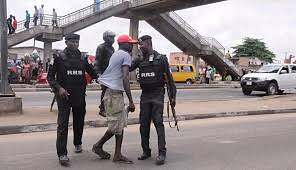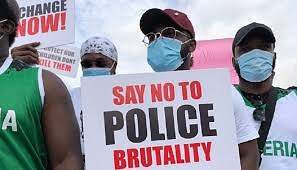Police brutality is a disturbing and distressing issue that has plagued Nigeria for far too long. It has caused anguish, outrage, and uproar amongst the people, and has led to several protests and demonstrations in the country.
The Nigerian Police Force (NPF) has been accused of utilizing excessive force, torture, and extrajudicial killings, among other forms of misconduct, leading to numerous cases of violence and mistreatment.
What is police brutality?
 Amnesty International defines police brutality as a term used to refer to various human rights violations by police. It is a human right abuse that includes beatings, forceful exploitation, racial abuse, unlawful killings, torture, or indiscriminate use of riot control agents at protests.
Amnesty International defines police brutality as a term used to refer to various human rights violations by police. It is a human right abuse that includes beatings, forceful exploitation, racial abuse, unlawful killings, torture, or indiscriminate use of riot control agents at protests.
Police brutality in Nigeria.
It’s been more than two years after the peaceful #EndSARS protests ended in a brutal crackdown by Nigerian security forces in Abuja, Lagos, and other parts of the country. Yet, no one has been brought to justice for the torture violence, and killings of peaceful protesters.
An investigation from Amnesty International revealed that the Nigerian Army and police killed at least 12 people on 20 October 2020 at Lekki toll gate and Alausa in Lagos. The body proved that pro-government supporters instigated violence at many demonstrations, providing cover for the police to use lethal force against peaceful protesters.  Today, harassment from corrupt police officers on the streets of Lagos has resumed. Many youths are languishing in jail for crimes they didn’t commit. Some lucky ones who have been released recounted shocking details that led to their unlawful arrests.
Today, harassment from corrupt police officers on the streets of Lagos has resumed. Many youths are languishing in jail for crimes they didn’t commit. Some lucky ones who have been released recounted shocking details that led to their unlawful arrests.
Many have died, so will not be able to tell their stories. We have also seen videos of some Nigerian police officers boldly demanding bribes from motorists or risk being arrested or even killed.
As usual, the youths are often the victims as many have been accused of being yahoo boys. Any young man wearing flashy clothes, tattoos, piercings, funky hairstyle, and driving a car is a suspect. Nothing has changed. SARS may have been disbanded, but it’s only a cosmetic effort by the government.
The Nigerian Police Force announced that Special Weapons and Tactics (SWAT) would now carry out the duties of SARS and that there would be “extensive reforms” within the police force. Yet, people are still complaining of extortion, extrajudicial killings, torture, ill-treatment, and everything familiar with police brutality in Nigeria.
For many years, citizens have been subjected to brutal and violent treatment by law enforcement officials, with little or no consequences for the perpetrators.
The abuse ranges from harassment at checkpoints to unlawful arrests, detention, and torture. The use of excessive force and extrajudicial killings are also prevalent, with many cases unreported or unresolved. This has caused a widespread sense of fear, mistrust, and unease among the populace.
The issue of police brutality has gained significant attention in recent times, largely due to social media and citizen journalism.
Nigerians have used social media to document and share their experiences of police brutality, leading to the emergence of the #EndSARS campaign in 2020. The campaign called for the abolition of the Special Anti-Robbery Squad (SARS) and police reform.
While the government disbanded SARS and promised police reform, the problem of police brutality still persists in Nigeria.
The lack of accountability for law enforcement officers who engage in misconduct remains a significant challenge. Reforms have been slow to materialize, and the issue continues to be a problem in the country.
Causes of police brutality in Nigeria.
Poverty: It is no news that the police force in Nigeria is not well paid. They live in squalid conditions in the so-called police quarters.
As a result, many of them turn to other means to survive, including forcefully extorting and torturing citizens.
All they need is money, and they are willing to do anything, including violating the human rights of individuals, to get it.
•Corruption and unreliable government;
Some time ago, a video of a Nigerian police officer boasting that he would kill a motorist and get away with it surfaced online.
Although the said officer has been arrested, it still goes to show the level at which the present administration should not be relied on to protect the lives and properties of citizens.
The ordinary Nigerian is always at the receiving end of inhuman treatment from the police, the same people that have sworn to protect them. They left their jurisdiction to arrest, jail, and shake down young men who appear well off.
Most of the time, they get away with their acts as the government does little or nothing to stop and punish offenders.
•Lack of training;
Nigerian police officers are trained before being deployed to their various posts. However, whatever training they’ve had is left behind at training schools because most of them behave more like thugs than officers of the law.
For instance, the police spokesperson revealed some time ago that it is unlawful for the police to demand to search an individual’s phone. But the reverse is the case on the streets as officers boldly seize and go through citizens’ phones.
Tell them it’s wrong, see if you will not receive slaps, and spend the next few days in jail.
•Greed; All they want is money. That is why they have diverted their attention from violent crimes to internet fraudsters, aka Yahoo Yahoo. Young men are the main target.
They would stop you, search you, find a costly gadget, especially if you’re well dressed, and label you a scammer. They allegedly carry POS with them, so it would be easy to force you to withdraw some cash using your ATM card.
If you resist, they might take you to their station, beat you until you confess to being a scammer, then your family or friends would bring them money to bail you out.
If you die during interrogation, they will dump your body someplace, your family will never find you, or they will simply accuse you of being an armed robber. They are AK47 trigger-happy criminals in police uniform, acting like demigods and making tons of money without being prosecuted.
Solutions to police brutality in Nigeria.
 Reform and decentralize the police force in Nigeria. Perhaps, this is the best time to introduce state police so the institution can be better managed.Hold the police accountable for their actions. Prosecute offenders within the institution and units.
Reform and decentralize the police force in Nigeria. Perhaps, this is the best time to introduce state police so the institution can be better managed.Hold the police accountable for their actions. Prosecute offenders within the institution and units.
Provide better training for officers and recruits.Increase the salaries of the police and improve their living quarters.Ensuring that the Nigeria Police Force is free from presidential and political interference.
Only an independent police force can foster professionalism.Elect credible individuals in political offices.
There is an urgent need for comprehensive police reform in Nigeria. The reform should include measures to ensure accountability for police officers who engage in misconduct.
There should be an independent oversight mechanism to investigate cases of police brutality and hold law enforcement officers accountable for their actions.
Training for police officers should be improved to emphasize human rights and the use of non-lethal force. The NPF should adopt a community policing approach that involves working with communities to identify and address security challenges. This approach should include regular engagement with communities to build trust and improve police-community relations.
The Nigerian government must also prioritize the provision of better working conditions and salaries for police officers. This will help to attract and retain qualified personnel, reducing the temptation to engage in misconduct and violence.
In conclusion, police brutality in Nigeria is a significant problem that must be addressed with urgency.
The government must take proactive steps to reform the NPF, ensure accountability for police officers who engage in misconduct, and prioritize the provision of better working conditions and salaries for law enforcement officers.
By adopting community policing and training officers to emphasize human rights and non-lethal force, the police force can regain the trust of the people and serve them effectively, rather than subjecting them to brutality and injustice.
 Yewande Mary Akanbi Esq is a Legal Practitioner, Principal Partner Marylisa Legal Consult, a political analyst, social media commentator, a blogger and currently the Young Lawyers Forum Secretary, NBA Bwari Branch
Yewande Mary Akanbi Esq is a Legal Practitioner, Principal Partner Marylisa Legal Consult, a political analyst, social media commentator, a blogger and currently the Young Lawyers Forum Secretary, NBA Bwari Branch
Email: marylisa967@gmail.com.
07065253159




